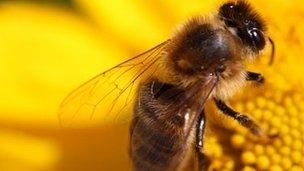Grass verge wildlife 'destroyed by councils'
- Published
- comments

Wildflowers on grass verges are a food source for bees and butterflies
Councils in the UK are destroying wildlife habitats by cutting grass verges too often, a charity has warned.
Plantlife said verges supported hundreds of species of flowering plants and should be cut twice a year.
It said three-quarters of councils it surveyed cut them multiple times. It received many calls from people "distraught" about the issue, it added.
But the Local Government Association (LGA) said keeping verges shorter was safer for both drivers and pedestrians.
Plantlife is calling on councils to better manage the almost 600,000 acres (240,000 hectares) of roadside verges across the country.
The verges support up to 1,000 plant species - including the rare bastard balm and long-leaved helleborine which are among 33 wayside flowers faced with extinction.
One road verge in Warwickshire has the country's largest population of pyramidal orchids.
It also has the UK's largest population of rockrose which attracts the scarce brown argus butterfly to the verge.
Plantlife said the A30 and A38 roads in Cornwall and Devon supported more than 1,000 acres of flower-rich grassland and one junction alone was home to six orchid species, including bee orchids and 1,100 greater butterfly orchids.
Wildflowers are also a vital food source for bees and butterflies, which have seen a significant decline in numbers in recent years.
Wildflowers that are left to seed also feed birds and small mammals.
'Thuggish plants'
Plantlife said verges should be cut - and the cuttings removed - once early in the year and again in the late summer.
Its survey found they were often cut multiple times over the summer.
None of the councils surveyed collected the cuttings, which rotted down and added nutrients to the soil - making it too rich for most wildflowers
Plantlife's Trevor Dines said the way road verges were managed encouraged "coarse and thuggish plants" such as nettles, docks and coarse grasses.
"Most verges, smothered in cuttings, might as well be just strips of concrete," he said.
"Plantlife receives more calls on this subject than any other from members of the public distraught and angry that their favourite verges, full of cowslips and orchids, are being mown down in the name of neatness and good management."
He urged people to help lobby for change by sending the charity "before" and "after" pictures of mown verges.
He said the charity was working with several councils, including Worcestershire and Hampshire, to protect plants including Deptford pinks and tower mustard.
LGA environment and housing board chairman Mike Jones said Britain's wild flowers were important and councils encouraged native species "where they can".
"However, councils must strike the right balance between road safety and wildlife," he said.
"Keeping road verges well maintained ensures that motorists have a good line of sight and allows pedestrians to walk more safely alongside busy roads.
"It also prevents weeds and foreign species from spreading into private gardens."
- Published16 April 2013
- Published28 March 2013
- Published26 July 2011